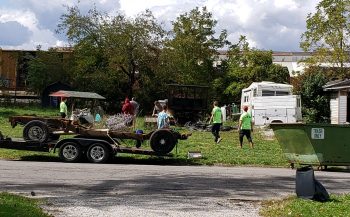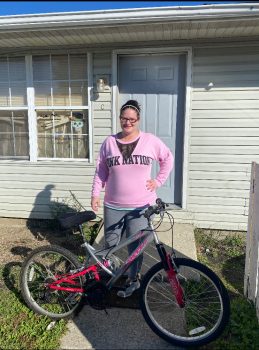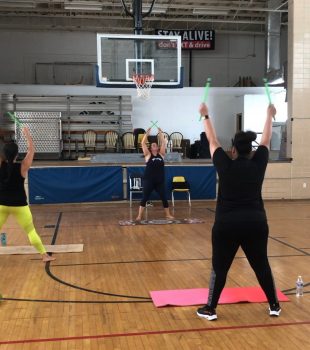Some innovative new programs at the Marion Municipal Court Probation Department are working to help their clients and the community.
One program is paying dividends for downtown Marion. Those on probation can earn $10 an hour towards their fines through community service. Community service is also used as a probation sanction for negative behaviors and for first-time offenders in the diversion program. The probation department partners with local charities including the Goodwill store, Habitat for Humanity, the local Humane Society, and the Salvation Army. In a new effort, they also directed clients to downtown beautification this summer.

“They help water flowers, plant mums, clean the alley for Main Street events, wash the sidewalks and repaint benches,” said Tom Stotts, Chief Probation Officer with Marion Municipal Court. “This alleviates costs to the city as well as beautifies our downtown.”
In addition, participants have taken part in a number of block clean-ups led by city councilmembers near Decatur Street and Jefferson Street and Polk Streets. Mary Street’s clean-up is in progress.
“It’s a collaboration – elected officials, community volunteers, city dump trucks, and community service members. Once the cleanups were finished, a lot of folks said they felt good doing it. They said they would come back and volunteer. It helped beautify those neighborhoods,” Stotts shared.
Participants have also helped clean up local parks and seven houses whose owners needed assistance.
A key part of probation involves getting clients into jobs and into treatment if they have addiction issues. Transportation can be a barrier. The probation department has found a creative solution with other local agencies.
The City of Marion receives unclaimed bikes. Inmates at Marion Correctional Institution repair them. Ten clients have received free bikes so far.
“Biking is free and it’s healthy!” said Probation Officer Tim Thacker. “It helps them get to their appointments. We could use more bikes.”

“The bike helps break barriers to get to treatment, to probation, and to work. That’s a part of their goals: gain or maintain employment. If substance use is involved in their case, to make sure they are treated,” Stotts shared. “It’s also enjoyable to go ride the Tallgrass Trails.”
Probation Officer Tim Thacker and Clerk Bevin Peppard started the program last year. Contact either of them to donate a bike.
Finding employment can be a challenge. The department recently partnered with Ohio Means Jobs and the Marion Naz to hold a job fair.
“One client was hired on the spot! Several others landed interviews the following week,” Thacker shared.
Probation officer Lindsey Cochran started a POUND® exercise class for clients. The workout program uses lightly weighted drumsticks for a high-energy workout class.

This weekly program is open to those on probation and participants in special courts: drug court, mental health court, and veterans court. The goal is to help those in recovery find a positive outlet and counterweight gain that can accompany sobriety. It provides a safe place to exercise with no negative judgement. A local instructor teaches the class for free.
“I am very proud of how our probation officers think outside of the box. They go above and beyond their daily job duties by coming up with extracurricular engagements involving prosocial activities for the participants. These activities benefit both the participant and our community,” said Judge Teresa Ballinger.
Thirteen people at the probation department supervise 1,300 people on probation. This means these workers need to find kinds of innovative programs that will make a difference to the clients and also in our community.
“I’m definitely proud of these programs and the officers who say: I want to start a bike program. I want to start an exercise program. I want to do community service. I’m proud that the staff wants to do the better good for the clients and recognize that we want to be a part of the community, help with transportation, and have pro-social activities,” Stotts said. “The old way of probation when I first started 20 years ago was solely to catch people doing something wrong and send them to jail. Yes, there are consequences if you don’t follow your probation, but jail is not the goal. It’s to get you back as a productive citizen. We want to help people reach that goal. These programs can definitely do that.”


















